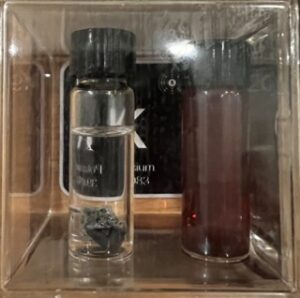Potassium
Atomic Number: 19
Atomic Mass: 39.0983 u

Potassium, one of the essential elements in both the human body and numerous industries, plays a significant role in modern society. Represented by the symbol ‘K’ (from Neo-Latin ‘Kalium’) and atomic number 19, potassium is a soft, silvery-white metal that is part of the alkali metal group. In this blog post, we will delve into the fascinating world of potassium, exploring its properties and the various ways it is used today.
Understanding Potassium
Potassium is the seventh most abundant element in the Earth’s crust and is found in many minerals. It’s known for being highly reactive, especially with water, and must be stored carefully to prevent unwanted reactions.
Key Uses of Potassium in Today’s World
1. Agriculture and Fertilizers
The most significant use of potassium is in agriculture. Potassium is a vital nutrient for plant growth, making it a key component of fertilizers. Potassium helps plants with water retention, disease resistance, and overall health. The most common form of potassium used in agriculture is potassium chloride, although potassium sulfate and potassium nitrate are also used.
2. Medicine
Potassium plays a crucial role in human health. It’s essential for the proper functioning of cells, nerves, and muscles. Potassium helps regulate heart rate and blood pressure, and its presence is vital for metabolic processes. In medicine, potassium is used in various forms, such as potassium chloride or potassium citrate, to treat or manage conditions like hypokalemia (low potassium levels) and kidney stones.
3. Food Industry
In the food industry, potassium compounds are used as food additives for various purposes. Potassium chloride can be used as a salt substitute for people on low-sodium diets. Other compounds, like potassium sorbate, serve as preservatives to prolong the shelf life of foods.
4. Industrial Applications
- Soap and Glass Production: Potassium is used in the manufacturing of soap and glass. Potassium-based soaps are softer and more soluble than sodium-based soaps, making them preferable in certain situations.
- Battery Technology: Potassium-ion batteries are emerging as an alternative to traditional lithium-ion batteries, offering a potentially cheaper and more abundant option for energy storage.
5. Scientific Research
In scientific research, potassium has various applications. Potassium-argon dating, for example, is a method used to date rocks and minerals based on the decay of the radioactive isotope potassium-40 to argon-40.
Environmental and Health Aspects
While potassium is essential for life, it must be handled with care in its pure, elemental form due to its reactivity, especially around water. In the human body, maintaining a proper balance of potassium is crucial; both too little and too much can lead to health issues.
Conclusion
Potassium is much more than just a dietary mineral essential for human health; it’s an element that permeates various aspects of our daily lives, from the food we eat to the products we use and the technology that powers our world. The diverse applications of potassium highlight its versatility and importance, making it a key element in both nature and industry. As we continue to explore and innovate, potassium’s role in various sectors is likely to grow, reflecting its fundamental importance in our world.
Hey kids, are you ready to learn some awesome facts about a super cool element called potassium? This element is not just important for our health, but it’s also pretty amazing! Let’s jump into the world of potassium and discover some fun things about it.
- It’s a Super Important Mineral: Potassium is a mineral that your body needs to work properly. It’s especially important for your muscles and heart. Every time you run, jump, or even blink, potassium is helping you out!
- Bananas Are Famous for It: You might have heard that bananas are a great source of potassium, and it’s true! Eating a banana can help keep your body strong and healthy.
- It’s Kind of Explosive: Potassium reacts with water to produce heat and hydrogen gas. This reaction is so vigorous that it can cause an explosion! That’s why scientists have to be very careful when they work with it.
- It’s Not Just in Bananas: Potassium is found in lots of foods, not just bananas. Potatoes, oranges, spinach, and avocados are also packed with potassium.
- A Key Player in Plant Life: Potassium is super important for plants too. It helps them use water and resist drought, and it’s a key ingredient in many fertilizers.
- A Soft and Silvery Metal: Pure potassium is a soft, silvery metal. It’s so soft you can cut it with a knife, just like butter!
- Glowing in Water: When potassium reacts with water, it creates a lilac-colored flame. But remember, it’s also very reactive, so this is something only trained adults should handle.
- It Keeps You Hydrated: Potassium helps your body stay hydrated. It works with other minerals to make sure the amount of water in your body is just right.
- Essential for Astronauts: Astronauts need potassium too! In space, it’s extra important for them to keep their muscles and heart working well, so they make sure to include potassium in their space diets.
- It’s Everywhere: Potassium is the seventh most abundant element in the Earth’s crust. That means it’s all around us, in the ground, and in many of the foods we eat.
So, there you have it – potassium is not only essential for keeping us healthy, but it’s also pretty fascinating. Next time you eat a banana or a potato, think about all the cool things that potassium does for you and the planet! 🍌🥔🌟
In this element box, there is potassium permanganate in water (the purple glass vial) and potassium metal under oil. The oil keeps moisture from coming in contact with the potassium. Potassium metal is very reactive to water and will begin producing heat on contact until it bursts into flames, popping, and crackling spraying molten potassium around.
No media at this time.
 using WordPress and
using WordPress and
No responses yet